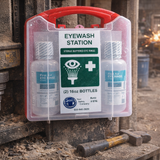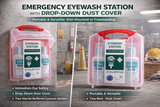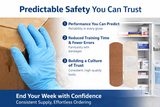Navigating the Medicine Aisle: A Guide to Safe and Effective Over-the-Counter Medication Use
We've all been there. A nagging headache, a persistent cough, or a sudden allergic reaction sends us straight to the pharmacy aisle, scanning rows of brightly colored boxes for a quick fix. Over-the-counter (OTC) medications are a convenient and accessible way to manage common ailments, offering relief for everything from minor aches and pains to seasonal allergies and digestive upset. But with convenience comes responsibility. While readily available, OTC drugs are still powerful substances that require careful consideration for safe and effective use.
The Power of OTCs: Convenience and Control
One of the biggest benefits of OTC medications is their accessibility. You don't need a doctor's appointment or a prescription, making them a cost-effective and immediate solution for many minor health issues. This empowers individuals to take a more active role in managing their own health, addressing symptoms promptly and often preventing them from worsening.
Common categories of OTC medications include:
-
Pain Relievers and Fever Reducers: Acetaminophen (Tylenol), ibuprofen (Advil, Motrin), naproxen (Aleve), and aspirin are go-to choices for headaches, muscle aches, and reducing fever.
-
Cold and Flu Remedies: Decongestants, cough suppressants (like dextromethorphan), expectorants (like guaifenesin), and antihistamines are often combined in multi-symptom formulas to tackle runny noses, congestion, and coughs.
-
Allergy Medications: Antihistamines (like loratadine, cetirizine, diphenhydramine) help alleviate sneezing, itching, and watery eyes caused by allergies.
-
Digestive Aids: Antacids, anti-diarrheals, and laxatives provide relief for heartburn, upset stomachs, and constipation.
-
Topical Treatments: Creams and ointments for skin irritations, minor cuts, and muscle aches (e.g., hydrocortisone, antibiotic creams, topical pain relievers).
The Risks You Need to Know
Despite their widespread use, it's crucial to remember that OTC medications are not without risks. Misuse or overuse can lead to serious health consequences. Some key risks include:
-
Side Effects: All medications can cause side effects. Common ones for OTCs include drowsiness, stomach upset, or dizziness.
-
Drug Interactions: OTC medications can interact with prescription drugs, other OTCs, or even certain foods and alcohol, potentially reducing effectiveness or causing harmful reactions. For example, some decongestants can raise blood pressure, which might be dangerous for someone on blood pressure medication.
-
Duplication of Ingredients: Many cold and flu medications contain similar active ingredients. Taking multiple products with the same ingredient (e.g., acetaminophen in a pain reliever and a cold medicine) can lead to an accidental overdose.
-
Allergic Reactions: While rare, some individuals can have allergic reactions to specific ingredients, ranging from mild skin rashes to severe breathing difficulties.
-
Abuse and Misuse: Certain OTC medications, particularly those containing dextromethorphan (DXM) found in cough syrups or pseudoephedrine (a decongestant), can be abused for their psychoactive effects. This can lead to serious health problems, including heart issues, brain damage, and addiction.
-
Underlying Health Conditions: Individuals with certain health conditions (e.g., high blood pressure, kidney or liver problems, bleeding disorders, asthma) may need to avoid specific OTC medications or consult a doctor before use.
Smart Steps for Safe OTC Use
To harness the benefits of OTC medications while minimizing risks, follow these essential tips:
-
Read the "Drug Facts" Label Carefully: This is your instruction manual! Pay attention to:
-
Active Ingredients: Understand what's in the medicine and what it does.
-
Uses: Ensure the product treats your specific symptoms.
-
Warnings: Look for information about side effects, drug interactions, and when to consult a doctor.
-
Directions: Adhere strictly to the recommended dosage, frequency, and duration of use. Never take more than directed.
-
Inactive Ingredients: Check for potential allergens.
-
-
Avoid Duplication: Be mindful of active ingredients across different medications you're taking. If you're using a multi-symptom cold medicine, don't also take a separate pain reliever that contains the same ingredient.
-
Consult Your Healthcare Provider:
-
If you're taking prescription medications, always ask your doctor or pharmacist if an OTC drug is safe to use alongside them.
-
If you have chronic health conditions, discuss any OTC medication use with your doctor.
-
If your symptoms worsen, don't improve after a few days, or if you experience unusual side effects, seek medical advice.
-
-
Measure Accurately: For liquid medications, always use the dosing device provided (measuring cup, spoon, or syringe) to ensure precise dosage. Never use household spoons, as they can lead to incorrect amounts.
-
Storage and Expiration: Store medications in a cool, dry place, out of reach of children and pets. Avoid storing them in humid areas like bathrooms, as moisture can degrade medications. Always check the expiration date and safely dispose of any expired or unused medicines.
-
Don't Share: Medications are prescribed or recommended based on individual health needs. Never share your OTC medications with others, and don't take medication prescribed for someone else.
Over-the-counter medications are invaluable tools for self-care, but responsible use is key to your health and safety. By taking a few extra moments to read labels, understand the risks, and consult with healthcare professionals when needed, you can make informed choices and find effective relief without compromising your well-being.
Recent Posts
-
Clean, Portable, and Ready: Why the Dust Cover is a Safety Game-Changer
In an industrial environment, the biggest enemy of your safety equipment isn't just time—it’s the en …3rd Mar 2026 -
The Eyewash Station: Your First Line of Defense in an Eye Emergency
In any workplace, safety should always be a top priority. When it comes to eye safety, every second …2nd Mar 2026 -
The Unsung Hero of Consistency: Why Your Team Trusts the Same Safety Supplies
Imagine trying to bake a cake with a different brand of flour, sugar, and eggs every time. The resul …27th Feb 2026



